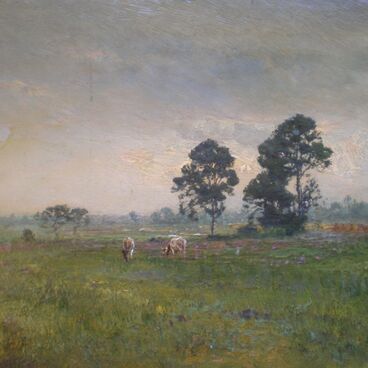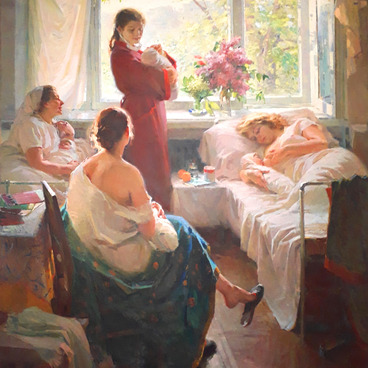The Soviet artist Fyodor Pavlovich Reshetnikov (1906–1988) was born in the village of Sursko-Litovskoye in the family of an icon painter. At the age of three, he was left an orphan. He was raised by his older brother Vasily, who had to leave the Kiev Art School. To feed the family, the older brother worked hard. He painted churches and in his spare time created icons.
Fyodor, although he was still a child, helped his brother as much as possible by doing the work of an apprentice. When he matured, the young Reshetnikov took on any job, starting with applying his existing skills in decorating buildings and ending with working as a sports instructor. In the second half of the 1920s, Fyodor Pavlovich went to Moscow, where he entered the art department of the workers’ faculty. From 1929 to 1934, he studied at the Higher Art and Technical Studios (VKhUTEMAS), in the workshops of Dmitry Stakhievich Orlov (Moor) and Sergey Vasilyevich Gerasimov.
During his student years, the work of Fyodor Reshetnikov was greatly influenced by Kukryniksy, a creative collective of Soviet caricaturists. Thanks to his talent, the young artist got the opportunity to take part in polar expeditions. He was taken there as an artist-reporter. For the 1932 expedition on the icebreaker Alexander Sibiryakov, the student was awarded the Order of the Red Banner of Labor.
In 1933, Fyodor Pavlovich went on a trip again as part of another expedition. That year he was accepted on the icebreaker Chelyuskin. During the Great Patriotic War of 1941–1945, Fyodor Reshetnikov took part in the defense of Sevastopol and the liberation of Crimea, worked as a war correspondent, collected material, and drew caricatures.
In 1953, Reshetnikov became a full member of the USSR Academy of Arts. A year later, Fyodor Pavlovich finished his work on the painting “Re-examination”. The central subject of the composition, which the artist executed like a theatrical set-up, is a boy forced to prepare for a re-examination. The artist skillfully conveyed the psychological state of the child: focused, dejected, he painfully hesitates between duty and thirst for freedom. Perhaps the boy is stopped by fear of his grandmother, whose presence is given away by glasses in an armchair and a ball of thread.
Fyodor Pavlovich
Reshetnikov is called one of the most prominent representatives of socialist
realism. His works were printed on postcards. In 1974, the master received the
honorary title of “People’s Artist of the USSR.”


